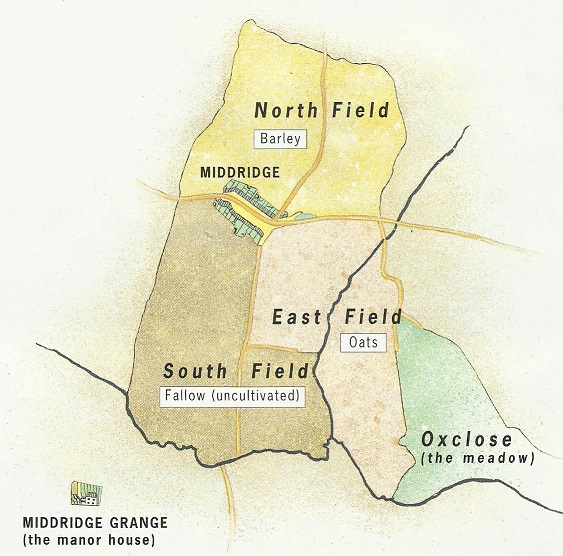
Feudal Dues

Introduction
What was life like for the villeins who lived in a feudal village?
The small village of Middridge in County Durham gives us an idea.

The Normans destroyed the Saxon village of Middridge and rebuilt it as two straight rows of huts. In 1183, Middridge was a concentration camp, into which the conquered Saxons had been herded.
The village lands were divided into three huge 'open fields'. Each villein had thirty strips of land scattered around the three fields. One field would grow barley, another would grow oats, and the third was left 'fallow' to rest the soil. The following year this was rotated, so that each field was given a rest in turn.
Read the text and study the Source, then answer the question sheet by clicking on the 'Time to Work' icon at the top of the page.
Links:
The following websites will help you research further:
The Villein:
•
The History Learning Site
- list of feudal services •
Timelines TV
- interesting video, but can you spot a couple of mistakes? •
A
serf's life - basic outline ('serf' is another name for 'villein')
though quiter hard •
Feudal incidents: this very difficult webpage suggests that the feudal system lasted so
long because it made the lords an awful lot of money
1 Life in Middridge in 1183
This extract is from Boldon Book (1183), a survey of the lands held by the Bishop of Durham.
(Mouse-over the words in brown to find out the meaning of the specialist words.)
In MIDDRIDGE there are 15 villeins and every one of them holds 30 acres and they give 8 chalders of malt and the same of meal and the same of oats, and 40 chalders of oat-malt and seven and a half cartloads of wood and 30 hens and 1,000 eggs and they pay £2 for their cattle and give 1 milking cow and do duty at the castle, and pay 15 shillings instead of reaping, and 5 shillings instead of waiting at the bishop's table at Christmas, and they work in all ways as the villeins of Heighington.
Wekeman holds 60 acres and pays 6 shillings and does 3 boon-works and ploughs 1 day and mows 1 day and carts hay and corn 2 days and supervises the boon-works and goes on the bishop's errands.
Factfile
Villeins were completely under the power of the lord of the manor. In return for their land they had to give him part of their crops and work without pay on the lord's land.
A villein also had to pay a merchet (so his daughter could marry), and supply free food when the lord's steward arrived to collect the crops. He had to pay the lord of the manor before he could grind corn, brew ale, bake bread, gather wood or sell his animals. He could not fish or hunt except on the Common.
A villein owned 'nothing but his own stomach' and was his master's possession. When a villein died, the lord of the manor took a tax called heriot (which included his animals, clothes, pots and possessions) and the Church took a tax called a mortuary.
He could not leave the manor without permission. If he did leave, the lord's men hunted him down.